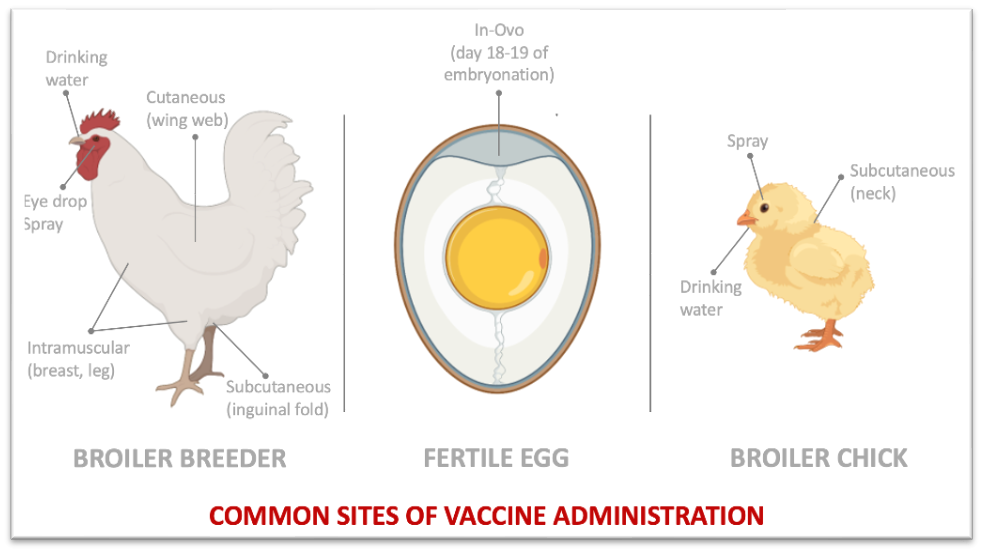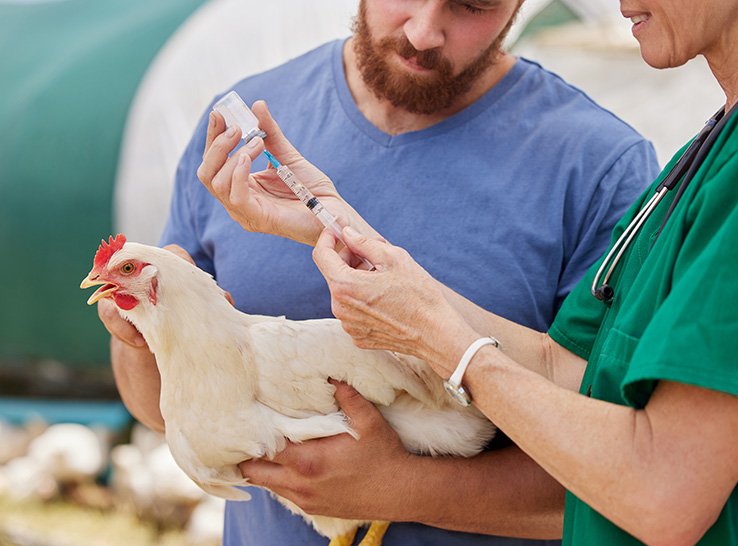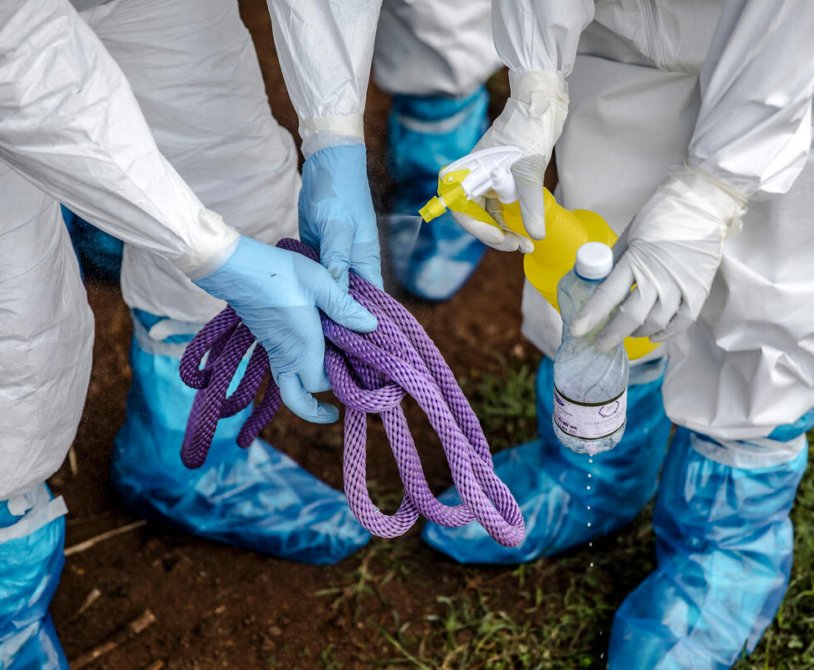Keeping your broiler chickens healthy and productive is key for poultry farmers. It’s important to make sure they get the right vaccinations. The right vaccines help protect them from diseases, improve their growth, and boost your farm’s profits.
This guide will cover why proper immunization is vital. We’ll look at common diseases, the best vaccine schedules, and how to manage vaccinations. By the end, you’ll know how to pick the best vaccines and set up a strong vaccination plan for your chickens.
Key Takeaways
- Proper immunization is essential for protecting broiler chickens from common poultry diseases and optimizing their growth and performance.
- Understanding the most prevalent diseases affecting broiler flocks is crucial for selecting the right vaccines.
- Implementing a recommended vaccine schedule tailored to the age and needs of your broiler chickens is crucial for effective disease prevention.
- Proper handling, storage, and administration of broiler chicken vaccines are critical to ensure they are effective and safe for your flock.
- Implementing comprehensive broiler flock health management and biosecurity measures can enhance the effectiveness of your vaccination program.
Understanding Broiler Chicken Vaccinations
Proper poultry immunization is key to broiler flock health. Vaccines boost a chicken’s immune system to fight off diseases. This protects them from common threats.
Importance of Proper Immunization
Immunizing broiler chickens stops diseases like Marek’s, infectious bursal disease, and Newcastle disease. These diseases harm flock health, leading to poor growth and high death rates. A good vaccination program keeps flocks healthy and productive.
Common Diseases Affecting Broiler Flocks
- Marek’s disease: A viral infection causing paralysis, tumors, and death in broiler chickens.
- Infectious bursal disease (IBD): Also known as Gumboro disease, IBD attacks the chicken’s immune system.
- Newcastle disease: A contagious viral infection causing respiratory issues, nervous system problems, and death.
Knowing about these diseases is vital for a strong poultry immunization plan. It helps protect broiler flock health and prevent diseases.
“Proper vaccination is essential for maintaining the health and productivity of broiler flocks. Investing in a comprehensive immunization program can safeguard your birds and ensure the long-term success of your poultry operation.”
How to Choose the Right Vaccines for Your Broiler Chickens
Choosing the right vaccines for your broiler chickens is key to their health and safety. It’s important to know how to pick the best vaccines for your flock. There are several factors to consider when making this choice.
First, understand the recommended broiler vaccines for your area. Different places face different diseases. Talk to your local vet or poultry expert to find the best vaccines for your flock.
Also, think about the age and stage of your broiler chickens. Vaccines for chicks, growers, and finishers differ. Make sure to follow a detailed broiler chicken vaccination plan for each stage of growth.
When looking at vaccines, consider their efficacy and safety. Look into the success of different vaccines and their safety record. Choose vaccines that have shown to work well and are safe for your birds.
“Investing in the right vaccines for your broiler chickens can make all the difference in the overall health and productivity of your flock.” – Dr. Avian Veterinarian
By understanding your flock’s needs and picking the right vaccines, you can protect them from diseases. This will help your broiler operation succeed and be profitable.
Recommended Broiler Chicken Vaccine Schedule
Keeping broiler chicken flocks healthy is key. A good vaccine schedule is vital. It covers the best vaccines and when to give them. This ensures your chickens are protected from common diseases at every stage of their life.
Age-Specific Vaccine Requirements
Broiler chickens need vaccines at different ages for the best protection. Here’s a look at the recommended vaccine schedule:
- Day-Old Chicks: Vaccines like Marek’s disease and infectious bronchitis are given early.
- 2-4 Weeks of Age: Vaccines for Newcastle disease, infectious bursal disease, and coccidiosis are given during this important growth phase.
- 4-6 Weeks of Age: Boosters for Marek’s disease, infectious bronchitis, and other respiratory diseases are needed to keep immunity strong.
- 6-8 Weeks of Age: Vaccinations for avian influenza, fowl cholera, and other diseases can be given based on local disease rates and vet advice.
The exact vaccines needed can change based on several factors. These include local disease rates, farm practices, and vet advice. Always talk to a poultry vet to create a vaccine plan that fits your flock’s needs.
| Vaccine | Recommended Age |
|---|---|
| Marek’s Disease | Day-Old Chicks |
| Infectious Bronchitis | Day-Old Chicks |
| Newcastle Disease | 2-4 Weeks |
| Infectious Bursal Disease (Gumboro) | 2-4 Weeks |
| Coccidiosis | 2-4 Weeks |
| Marek’s Disease Booster | 4-6 Weeks |
| Infectious Bronchitis Booster | 4-6 Weeks |
| Avian Influenza | 6-8 Weeks |
| Fowl Cholera | 6-8 Weeks |
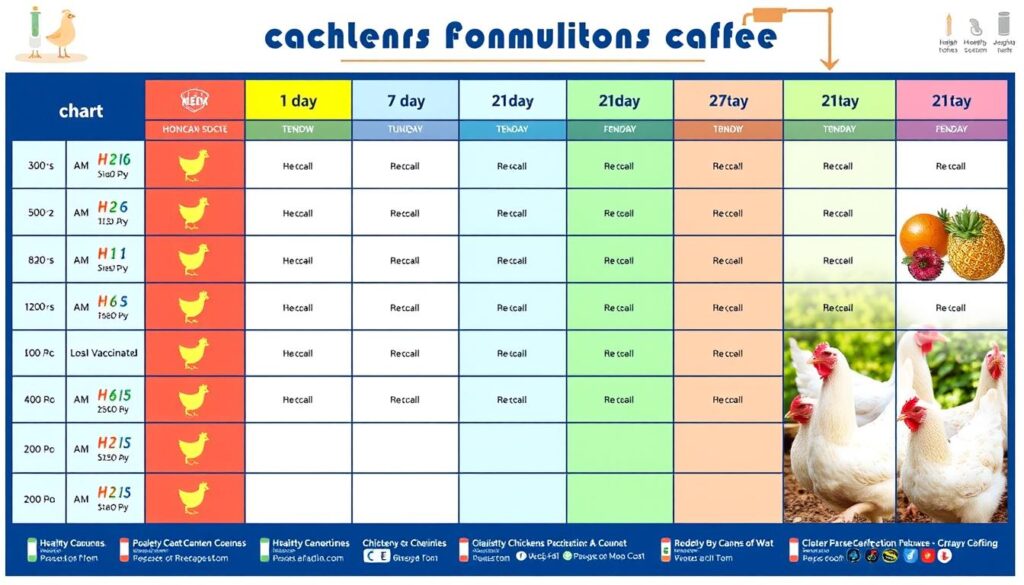
Following the recommended vaccine schedule is crucial for your flock’s health and productivity. By being proactive with vaccinations, you can protect your chickens from common diseases. This helps them grow to their full potential.
Administering Broiler Chicken Vaccines
It’s key to give vaccines to keep broiler chickens healthy. There are different ways to give vaccines, each with its own benefits and things to think about.
Proper Handling and Storage of Vaccines
Before you give any vaccine, make sure to handle and store it correctly. Vaccines for chickens need to stay between 35°F and 46°F (2°C and 8°C). If they get too hot or cold, they won’t work well.
When you handle vaccines, use clean tools and follow the maker’s guide. This ensures the vaccines work well for the chickens.
- Store vaccines in a fridge or cooler at the right temperature
- Use clean, sterile syringes and needles for vaccine administration
- Follow the manufacturer’s guidelines for reconstituting and administering the vaccines
By following these steps, farmers can keep their chickens safe from diseases. This helps keep the farm healthy and productive.
Broiler Flock Health Management Strategies
Keeping broiler flocks healthy is key to any poultry farm’s success. By using broiler flock health management strategies, you boost your vaccination program. This also helps stop avian diseases and keeps your poultry farm’s biosecurity measures strong.
Strong biosecurity measures are vital. This means controlling who comes in, keeping everything clean, and quarantining new birds or items. A secure place helps stop diseases and keeps your flock safe.
It’s also important to keep the environment right for your birds. This means the right temperature, humidity, and air flow. Checking and adjusting these things helps prevent avian diseases and keeps your birds healthy.
Watching your birds for sickness is another big part of broiler flock health management. Spotting and dealing with health issues fast helps stop diseases from spreading. This keeps your whole farm healthy.
By focusing on broiler flock health management, you can make your chickens healthier and more productive. This ensures your poultry farm does well for a long time.
Poultry Farm Biosecurity Measures
Keeping broiler chickens safe from diseases is key. Poultry farms use strict biosecurity to control who and what enters. This helps keep the chickens healthy and productive.
Preventing Disease Transmission
Good biosecurity is vital to stop diseases in broiler flocks. Here are important steps poultry farms can take:
- Strict access control: Limit visitors and make them follow biosecurity rules, like wearing protective clothes and disinfecting their shoes.
- Dedicated equipment and vehicles: Make sure all farm tools and vehicles are only for the poultry farm. They must be cleaned and disinfected well.
- Proper waste management: Have a good system for getting rid of dead birds, litter, and other risky materials safely.
- Rodent and pest control: Keep an eye on and control rodents, insects, and other pests that can carry and spread diseases.
- Strict hygiene protocols: Make sure everyone washes their hands, cleans and disinfects surfaces, and keeps the farm clean.
By following these steps, poultry farms can greatly reduce disease risks. This keeps their chickens healthy and productive.
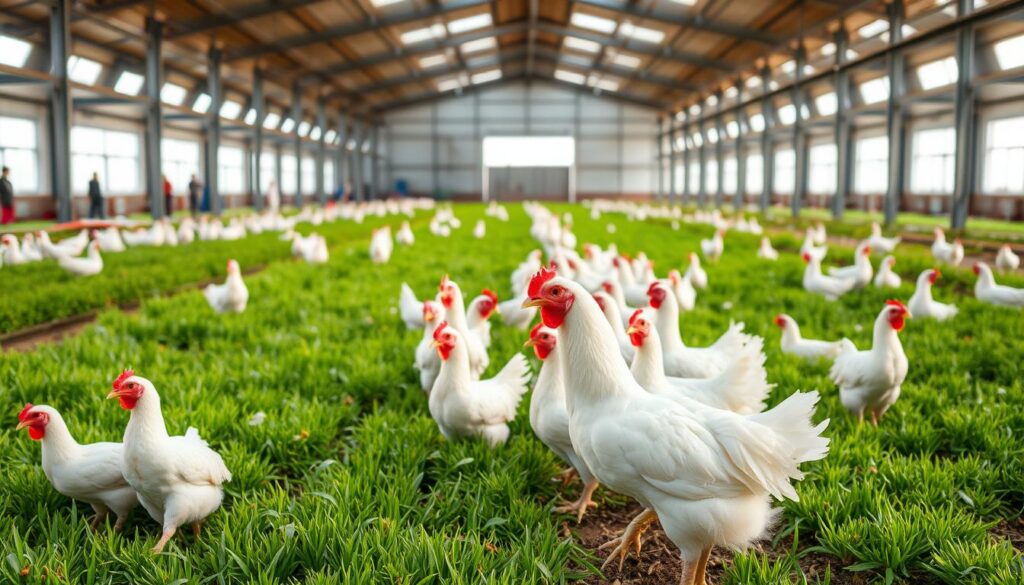
| Biosecurity Measure | Purpose |
|---|---|
| Strict access control | Limit the introduction of pathogens by controlling the movement of people on the farm. |
| Dedicated equipment and vehicles | Prevent the spread of diseases through the use of contaminated equipment and vehicles. |
| Proper waste management | Safely dispose of potentially infectious materials to reduce the risk of disease transmission. |
| Rodent and pest control | Eliminate potential disease vectors and prevent the introduction of new pathogens. |
| Strict hygiene protocols | Maintain a clean and sanitized environment to minimize the spread of diseases. |
By using these detailed biosecurity steps, poultry farms can protect their chickens from diseases. This ensures the health and success of their operation.
Addressing Vaccine Failures and Adverse Reactions
In the poultry industry, keeping broiler chickens healthy is key. Vaccinations play a big role in this. But sometimes vaccines don’t work as expected, or birds can have bad reactions. It’s important to understand why and how to fix these problems to keep chickens healthy and productive.
One reason vaccines might not work is if they’re not handled right. Things like wrong temperatures, bad storage, or wrong injection methods can mess up the vaccine. To avoid these issues, it’s crucial to follow the vaccine maker’s instructions closely and stick to the right handling steps.
- Proper storage of vaccines at the recommended temperature range
- Thorough training of personnel on vaccine administration techniques
- Implementing quality control measures to ensure consistent vaccine delivery
Adverse reactions to vaccines can also happen. These can range from mild to serious. The bird’s age, breed, health, and the vaccine type can all play a part. Keeping a close eye on the flock and quickly spotting any bad reactions is key.
“Proactively addressing vaccine failures and adverse reactions is essential for maintaining the health and productivity of your broiler chicken flock.”
To handle bad reactions, having a clear plan is important. This includes watching the flock closely, keeping detailed records, and having a vet ready to help if needed.
By tackling vaccine failures and bad reactions head-on, poultry farmers can make their vaccination programs work better. This helps keep their broiler chicken flocks healthy and productive for a long time.
Avian Disease Prevention: A Comprehensive Approach
In broiler chicken farming, preventing diseases is key to your flock’s health. Vaccination is important, but it’s just part of a bigger plan. This plan includes keeping the environment clean, monitoring health closely, and more.
Understanding the threats to broiler chickens is the first step in avian disease prevention. Diseases like infectious bronchitis and Marek’s disease can hurt your farm’s success. A comprehensive approach to broiler flock health management helps prevent these problems.
The core of this strategy is using vaccines, keeping the environment clean, and managing health. The right vaccines protect against common diseases. Good biosecurity, like keeping the place clean and controlling pests, stops diseases from spreading.
But there’s more to it. A good environment is also crucial. This means clean air, the right temperature, and good litter. These things help your chickens stay healthy and strong against diseases.
By taking a comprehensive approach to avian disease prevention, farmers can raise healthy, productive flocks. This means using vaccines, keeping things clean, and managing the environment. It helps your farm succeed and keeps your chickens healthy and happy.
We’ve looked at why picking the right vaccines for your broiler chickens is so important. We’ve covered the basics of poultry immunization and how to create a good vaccination plan. These steps can protect your chickens’ health and keep them productive.
Using the right broiler chicken vaccinations is key to stopping diseases and keeping your flock healthy. Knowing about common diseases affecting broiler flocks and how to choose the right vaccines helps you protect your birds. This way, you can keep them healthy and working well.
A strong poultry immunization program is crucial for a healthy broiler operation. Stick to the vaccine schedule and follow best practices for vaccine use and storage. This will help you get the most out of your vaccination plan and keep your broiler business thriving.
FAQ
What are the most important considerations when choosing vaccines for broiler chickens?
When picking vaccines for broiler chickens, think about the diseases common in your area. Also, consider the age and health of your flock. Choose vaccines that are safe and effective to protect your chickens from diseases.
What are the common diseases affecting broiler flocks?
Broiler flocks face many diseases, like Marek’s disease and Newcastle disease. Knowing these threats helps you plan a good vaccination strategy.
What is the recommended vaccine schedule for broiler chickens?
The vaccine schedule for broiler chickens depends on their age and health. Following a proper timeline is key to protecting them from diseases.
How should broiler chicken vaccines be administered?
Vaccines for broiler chickens can be given in different ways, such as injections or through water. It’s important to handle and store vaccines correctly. This keeps them effective and safe for the birds and farm workers.
What are the key biosecurity measures for poultry farms?
Good biosecurity for poultry farms includes controlling who and what enters the farm. It also means keeping the farm clean and managing its environment. These steps help prevent diseases from spreading.
How can vaccine failures and adverse reactions be addressed?
Vaccine failures and bad reactions in broiler chickens can happen for several reasons. Understanding these can help you manage them. By addressing these issues, you can protect your flock better.


